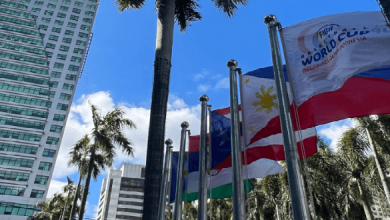

In commemoration of World Children’s Day on November 20, UNICEF is amplifying the voices of many Filipino children experiencing various threats to the fulfillment of their rights and urges the Philippine government and society to listen to their concerns.

This year’s anniversary of the Convention on the Rights of the Child, the most widely ratified human rights treaty in the world, takes place during one of the most challenging moments for the fulfillment of children’s rights in the Philippines. The COVID-19 pandemic, combined with a threatening typhoon season, has upended thousands of children’s lives and has left many more children uncertain about their future.
Children face a trifecta of threats: direct consequences of the disease itself, interruption in essential services, and increasing poverty and inequality.
A UNICEF report, Averting a Lost COVID Generation, reveals data from different countries of the dire and growing consequences for children as the pandemic drags on. Children’s and adolescents’ mental health has suffered during the pandemic. Globally, the number of children living in multidimensional poverty –without access to education, health, housing, nutrition, sanitation, or water is estimated to have soared to a 15 percent increase, an additional 150 million children by mid-2020. To address these, UNICEF recommends a Six Point Action Plan that calls on governments and partners to prioritize children’s needs:
- Ensure all children learn, including by closing the digital divide.
- Guarantee access to health and nutrition services and make vaccines affordable and available to every child.
- Support and protect the mental health of children and young people and bring an end to abuse, gender-based violence, and neglect in childhood.
- Increase access to clean water, sanitation, and hygiene and address environmental degradation and climate change
- Reverse the rise in child poverty and ensure an inclusive recovery for all; and
- Redouble efforts to protect and support children and their families living through conflict, disaster, and displacement.
“We must listen to children and young people now, working with them to secure a better future,” UNICEF Philippines Representative Oyunsaikhan Dendevnorov says. “In the years to come, children and young people will be living with the impact of this pandemic and with the consequence of how we choose to respond. They must have a say in the decisions that will affect their future.”
UNICEF social media channels are highlighting the voices of young people like Vanessa, 21 years old, who are speaking up about their experiences, needs, and aspirations for the future.
“Right now, children need to be reassured that they will be safe and that there is a brighter tomorrow. They need to be supported, as they try to adjust to these changes brought about by this pandemic at a pace that they are comfortable in. They need to be secured, be kept safe and protected from all the threats that are heightened during this time,” she says.
“I have the right to learn and make my dreams come true. I want to be a doctor and heal the sick and save lives. I dedicate my life to Bangsamoro children. We all have the right to dream,” Bai Aleyah Limba, 10 years old from Cotabato City, shares.
On November 20, UNICEF Philippines calls upon children and youth to raise their voices and calls upon adults to listen to them and commit to acting on their concerns.
“Today, together with my fellow National Goodwill Ambassadors Anne Curtis and Daphne Oseña-Paez, I join the children and young people of the Philippines in reimagining a better world for every child. A world where they are healthy, educated, safe, and protected. A world where they enjoy all of their rights. Let’s make this reimagined world a reality for every child,” UNICEF Goodwill Ambassador Gary Valenciano says.







